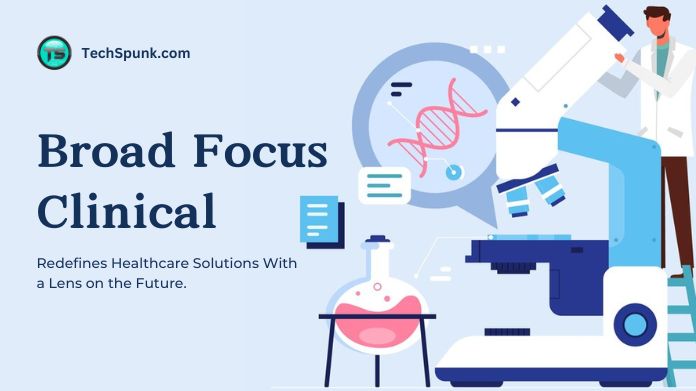Are you browsing through various clinical trial websites and trying to decide which one to consider and which one to avoid?
Are you currently considering Broad Focus Clinical as an option but unsure if you should give it a try? Rest assured, you are not alone in feeling uncertain about this.
Thankfully, we have conducted thorough research to provide you with the answer to the question: Is Broad Focus Clinical legitimate option?
Therefore, this article will explore the concept of Broad Focus Clinical and elucidate the various ways in which you can generate income through their platform.
Table of Contents
What Is Broad Focus Clinical?
 Broad Focus Clinical is a platform committed to facilitating the connection between individuals who are interested in participating in clinical research studies and the researchers conducting these studies.
Broad Focus Clinical is a platform committed to facilitating the connection between individuals who are interested in participating in clinical research studies and the researchers conducting these studies.
It serves as one of the clinical research websites that effectively links eligible participants to paid clinical trials.
The primary objective of these paid clinical trials is to contribute to the advancement of medicine by allowing researchers to assess the effects of certain medications, often safe, on individuals who volunteer in exchange for compensation.
Broad Focus Clinical asserts that they have the capability to connect you, as a willing participant, to a study that aligns with your mental and physical qualifications, provided that you reside in the same state or are open to traveling.
It is important to note that they do not conduct the trials themselves; instead, they send newsletters via email to their subscribers, informing them about opportunities within their community.
How Does Broad Focus Clinical Work?
Broad Focus Clinical operates through a streamlined process to connect eligible individuals with paid clinical studies.
The process can be summarized as follows:
- Registration: Interested individuals can sign up or contact Broad Focus Clinical, providing basic information and potentially specific details about their health and medical history.
- Screening: Broad Focus Clinical screens the registrants to identify those who may qualify for available clinical trials. This screening is based on the criteria set by the studies, which may include medical conditions, age, location, and other relevant factors.
- Matching: Once the screening is complete, participants are matched with clinical trials for which they are eligible. This matching process takes into account the participant’s preferences, eligibility criteria, and logistical considerations like travel.
- Informed Consent: When a suitable match is found, participants are provided with detailed information about the study. This includes the purpose of the study, the procedures involved, the potential risks and benefits, and the compensation offered. Participants must give informed consent before joining the study.
- Enrollment and Participation: After providing consent, participants are enrolled in the clinical trial and actively participate in the research. This may involve taking medications, undergoing tests, or following specific procedures as outlined in the study protocol.
- Follow-up and Compensation: Participants may receive follow-up care or observation after the trial is completed. Additionally, they are compensated for their time and participation as agreed upon beforehand.
Is Broad Focus Clinical Legit?
The question “Is Broad Focus Clinical Legit” arises due to their website’s lack of comprehensive information to assess their legitimacy.
Moreover, there is a dearth of information or reviews on reputable websites such as the Better Business Bureau or Trust Pilot.
The inquiry into “Is Broad Focus Clinical Legit” deepens with the discovery that social media links on their site lead nowhere, suggesting inactive accounts.
Furthermore, their website displays third-party Google ads, which, while not overly intrusive, do occasionally appear.
On a positive note, they do not require any financial information during the sign-up process. Although not outright fraudulent in terms of financial transactions, the collection of personal information under false pretenses is a significant concern.

Here are some red flags and protective steps you can consider:
Red Flags of Scam Clinical Trial Websites
- Vague Information: Lack of clear, detailed information about the clinical trials, including the purpose, procedures, risks, and who is conducting them.
- No Verifiable Affiliations: Claims of affiliations with reputable institutions or organizations that cannot be verified independently.
- Excessive Personal Information Requests: Asking for detailed personal information without providing much information about the clinical trials or the protections in place for your data.
- Lack of Transparency in Consent Process: If the website does not clearly outline the informed consent process or downplays the risks involved in participating.
- Unverifiable Contact Details: If the contact information provided (phone numbers, email addresses, physical address) does not lead to genuine, verifiable contact with the organization.
- Pressure Tactics: Urging you to make quick decisions about joining a trial without giving you enough time to consider the details or consult with a healthcare professional.
Steps to Protect Yourself
- Conduct thorough research on websites and organizations before sharing personal information by looking for independent reviews or information on reputable forums.
- Consult with healthcare professionals, such as doctors, before considering joining any clinical trial.
- Verify the legitimacy of clinical trials by checking recognized registries like ClinicalTrials.gov or the WHO’s International Clinical Trials Registry Platform.
- Be cautious about the personal information you provide, understanding how it will be used and stored to protect your data privacy.
- If you suspect a website is involved in a scam, report it to relevant authorities such as health regulatory agencies, consumer protection organizations, or internet safety groups.
Frequently Asked Questions
Q. Is Broad Focus Clinical Legitimate?
Ans. Verify through clinical trial registries like ClinicalTrials.gov, seek independent reviews, and check for clear communication and privacy policies.
Q. What Are the Red Flags Indicating Broad Focus Clinical Might Not Be Legitimate?
Ans. Vague trial details, excessive personal information requests without privacy assurances, and pressure to participate quickly are red flags.
Q. Should I Give My Personal Information to Broad Focus Clinical?
Ans. Only if you’re confident in their legitimacy and understand how they’ll use and protect your data.
Q. What Do I Do if I Think Broad Focus Clinical is a Scam?
Ans. Report to regulatory bodies or consumer protection agencies and stop sharing further information.
Q. Can Broad Focus Clinical Charge Me for Their Services?
Ans. Legitimate clinical trial services typically don’t charge participants. Be wary of any fees for connecting you to trials.
Q. How Can I Find Legitimate Clinical Trials Without Such Services?
Ans. Directly search clinical trial registries, contact research hospitals or universities, or consult healthcare providers.
Q. What if I’ve Already Shared My Information With Them?
Ans. Monitor for unusual account activity and consider informing your healthcare provider about potential data misuse.
Final Verdict
In summary, evaluating the credibility of Broad Focus Clinical or any clinical trial service is essential. When asking, “Is Broad Focus Clinical legit?” do your homework by checking trial listings, understanding their data policies, and consulting healthcare experts.
Watch out for red flags like transparency issues, excessive personal data requests, and pressure tactics. Legit services will offer clear info, have proven affiliations, and follow ethical guidelines. If in doubt or spotting red flags, consider alternatives and report concerns to authorities.
Always put your safety and privacy first when joining clinical trials.





